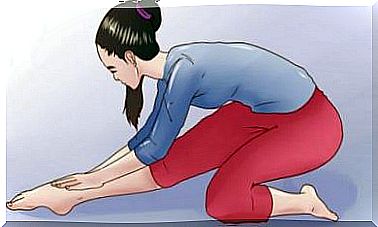Fighting A Cold With These 10 Steps

The common cold is a disease that strikes when your immune system is weakened. It is a viral infection that affects the health of the upper respiratory tract (nose and throat). In this article, we share 10 steps that can help you fight a cold.
Colds are more common when it is cold, although it can occur at any time because there are many types of cold viruses.
While they are usually not life-threatening or cause complications, they can produce uncomfortable symptoms that can put you out of business for several days.
As such, it is important to know how to control them at home, by adopting healthy habits that support respiratory health without medication.
In this article, we’ll look at some of the causes of a cold and 10 things you can do to recover without much effort.
Causes of the common cold
There are many viruses that can cause a cold, but most are caused by the rhinovirus.
These microorganisms enter the body through the mouth, eyes or nose. They can be spread to other individuals through contact with airborne droplets when an infected person coughs, sneezes, or speaks.
To a lesser extent, they can also be spread through shared items, such as utensils, towels, and toys. There is a possibility of transferring them if you touch your eyes or mouth after exposure.
Those most at risk and risk factors include:
- Children under 6, especially those who attend daycare
- Individuals with a weak immune system
- People who smoke
- Winter time or autumn
- Contact with an infected person
Symptoms of a cold

Cold symptoms usually appear one to three days after contact with the virus. They can manifest in different ways in each person, depending on the response of the immune system.
Symptoms include:
- Stuffy nose
- A sore throat
- Dry cough or with mucus
- Chest congestion
- Body aches and headaches
- To sneeze
- General discomfort
Steps to fight a cold
There are many over-the-counter medications that help control cold symptoms. However, it is also a good idea to know how to fight colds naturally.
1. Complete rest

It is crucial to rest to avoid any complications of a cold. Your body is fighting a virus and has to use its energy for that.
2. Quit Smoking
Cigarette smoking can lead to serious complications in people with a cold. If you smoke, it is important that you stop to recover faster.
3. Eating well
A healthy diet is very important for strengthening the immune system. If you are recovering from a cold, make sure you eat at least three healthy and balanced meals a day.
4. Keep Warm

Cold weather tends to make cold symptoms worse. Therefore, try to stay warm and dress properly until you feel better.
5. Drink enough fluids
Increasing your consumption of water and healthy drinks is crucial to prevent dehydration while the infection persists. Try to drink at least two liters of water a day.
6. Eat citrus fruits
Eating lots of citrus fruits gives your body a dose of vitamin C. This nutrient strengthens the immune system and improves your body’s response to cold viruses.
7. Nasal Rinse

If your nose is very stuffy, try a nasal rinse. It is a simple, painless procedure that helps to clear the mucus.
8. Do not use antibiotics
Beware! Colds cannot be treated with antibiotics. This disease is caused by viruses and antibiotics are for bacterial infections.
9. Drink herbal tea
There are dozens of teas made with plants, herbs, and fruits that can help reduce cold symptoms. Consuming them several times a day reduces congestion and headaches.
10. Avoid sudden changes in temperature
One of the reasons you should rest completely when you have a cold is to avoid sudden temperature changes. While they don’t always have a major impact, they can prolong the duration of symptoms.
Do you suffer from cold symptoms? Then try to follow all these recommendations that will help you fight the common cold and speed up your recovery. If you have a fever or difficulty breathing, see your doctor.
While the common cold rarely leads to complications, it can sometimes lead to ear infections, asthma attacks, or acute sinusitis.









